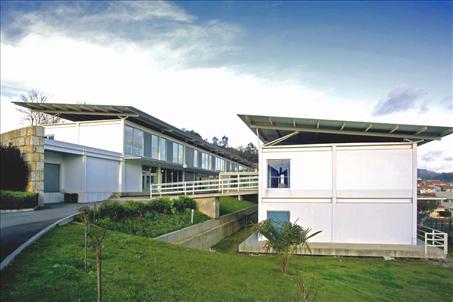Description of School
The Braga International School (Colégio Luso-Internacional de Braga), a Private/Particular school, is a co-educational and non-denominational school created for children between 3 and 18 years of age.
This school was created to offer to all of the students an academically rigorous program with a cross-cultural character in an open and modern atmosphere that incorporates new technologies and focuses attention on the student. As such, the school strives to expand each child’s personal and social capacities, widen the intellectual and physical horizons of the student and nurture each young person’s creativity.

More informations about our school
LANGUAGE AND CULTURE
The school prepares students from a multicultural and multilingual background for the future and for this reason English is the principal language used in the majority of the classes. At the same time, our students, mostly Portuguese, acquire proficiency in the Portuguese Language and familiarity with the history, culture and geography of Portugal. Experience has demonstrated that our students achieve a level of proficiency in the Portuguese language equivalent to those students who attend a monolingual school. Investigations into multilingual education suggest that the earlier a child is exposed to other languages, the easier those languages are acquired. Similarly, the native language is also enriched by the experience.
CURRICULAR PROGRAMME
The school is integrated in the network project of schools started at Colégio Luso Internacional do Porto, followed by Colégio Luso-Internacional do Centro (Marinha Grande) and through our relationship with them in international networks of schools such as ECIS (European Council of International Schools).
CLIB’s curricular programme is conceived to allow equivalency on all levels with the Portuguese educational system and other international Schools and facilitates access to university, whether Portuguese of foreign.
One of the main goals of our school is to foster cognitive development and to teach students the skills needed for high-order thinking, skills indispensable to manage the high level of complexity required in a post –modern society. We believe that it is essential for our students and teachers to master skills, which will enable them to live creative, fruitful and successful lives in this new world.
Although we consider ourselves to be one school we are subdivided into three departments:
- INFANT DEPARTMENT
For students aged 3 and 4 years (Pre-prep and Prep), the Infant Department is the foundation of his or her education. The curricular orientation, developed from a system of Portuguese pre-school education in conjunction with the British education system, offers a model for this department with the quality and flexibility necessary for developing the potential of a child, that in most cases, is in a school environment for the first time.
- LOWER SCHOOL (Reception – Form 4)
The Lower School promotes and develops the potential of each student by creating a scholastic experience that allows the student to begin to understand more about the world around them.
- UPPER SCHOOL
(Form 5 – Form 8) The Upper School is organised in a way that provides students with the maximum opportunity to develop good study and work habits; especially those directly connected to the investigative methodology. Spanish as a third language is compulsory from Form 5. The basic objective for a student completing Form 8 and preparing to enter Upper School is to develop the ability to carry out autonomous investigation, to demonstrate motivation and academic proficiency.(Form 9 – Form 12)Form 9 and 10 follows the curricular programs of the IGCSE (International General Certificate of Secondary Education). At the end of the 10th year, and in some cases the end of the 9th year, the students complete examinations developed by Cambridge University through their exam department CIE (Cambridge International Examinations). In Form 11 and Form 12, students prepare for AICE exams (Advanced International Certificate of Education) also from Cambridge University
EXTRA CURRICULAR ACTIVITIES
All the academic programme is based on the education of the pupil as a complete being and, although the emphasis is put in search of academic excellence, the pursuit of cultural and physical activities, essential to the pupil’s total development, is not disregarded. The School organises programmes for the pupils that wish to participate in the extra curricular activities after the normal academic timetable –the CLIBclubs.
So, the pupils participate in a series of activities that complement and bring out the experiences lived in the classes. These activities focus on the development of the various forms of creativity and arts, body and movement, communication and expression. Specifically, the pupils participate in exercises organised around various subjects, such as music, plastic arts, drama and sports.




